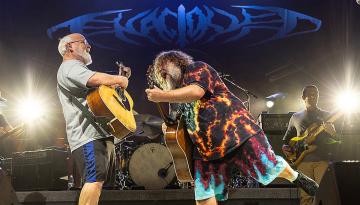A young heir to a massive empire goes on a murderous rampage after his father is attacked by enemies. Sounds familiar? Don’t panic, Animal is over. This is the premise for Alexander: The Making of a God, the new quasi-historical, quasi-documentary on Netflix, which traces (in minimal detail) Alexander the Great’s campaign across Asia hundreds of years before the birth of Christ.
Like the recent Cleopatra docu-series, however, The Making of a God is about as scholarly as a DU lecture spent in the college canteen. The majority of its six episodes is devoted to cheesy interpersonal drama and basic exposition. These reenactments are punctuated by talking head interviews with actual scholars, who explain their fascination and admiration for the great general with differing levels of enthusiasm. It’s like they participated in exactly one interview each, which is about as low-effort as things can get.

Also read – Queen Cleopatra review: Controversial Netflix documentary deserves to be buried in a crypt
One Welsh professor, however, is particularly articulate, regularly conjuring images beyond the show’s limited budget. A second professor, on the other hand, can’t help but pepper her commentary with contemporary references. For instance, she describes Alexander’s successful cutting of the Gordian knot as a massive ‘PR win’. The knot had defied challengers for years, and much like what happened after Arthur pulled the sword out of the stone, Alexander’s reputation grew after word spread about the clever way in which he tackled the problem — instead of untangling the knot as expected, he simply chopped it up. It’s the historical equivalent of Indiana Jones shooting that villain in Raiders of the Lost Ark instead of engaging him a swordfight.
At various times in the show, Alexander is described as a ‘genius’ and a ‘god’. Often, it’s like the show itself is prostrating before his memory, which is yet another similarity that it shares with Sandeep Reddy Vanga’s film. “He was the greatest military mind of all time,” one scholar says early in episode one. “He was also a scientist, a philosopher, a poet, an inventor…” But you wouldn’t necessarily pick up any of these qualities via the reenactments. This wouldn’t be a problem had the ratio not been so skewed in their favour. Barely five minutes in total are spent on the ground, at an archeological site in Alexandria; roughly 10% of the show is talking heads. But the rest of it is a cheap Game of Thrones knockoff with poor dialogue and uninspired acting.
“Without reinforcements we could suffer the fate of Antaeus,” one of Alexander’s generals warns him ahead of a battle. He then explains the reference for the audience’s benefit: “He was crushed to death by Heracles.” And Hephaestion replies, rolling his eyes, “I got that one.” The three main ‘characters’ — Alexander, Hephaestion and Ptolemy — don’t even call themselves by their actual names. In a bizarre attempt to seem relatable to audiences who’d rather play God of War than watch this, the show forces them to refer to each other as ‘Alex’, ‘Heph’ and ‘Ptol’, as if they’re British kids on a gap year in the Mediterranean.
The show fails to drum up any dramatic stakes as Alexander conquers territory after territory in his campaign to capture and defeat the Persian king Darius III. Because the reenactments aren’t juxtaposed with footage of the real locations where these battles were fought, or a glimpses at a ruin or two, even the audiences most fascinated with this period in history would find it difficult to hold interest in the proceedings.
This, perhaps, is the genre of storytelling that could benefit the most from artificial intelligence. Everybody knows that dramatic reenactments are the cheapest solution to production limitations, and it doesn’t really cost much to corral five professors in a small studio. The real logistical problems usually come in the form of permits and travel. Want to see what Babylon looked like when Alexander walked its streets? AI can probably get it done. But narrative obstacles aside, the show also appears to have ruffled some feathers when it comes to its depiction of Alexander as a bisexual man. A similar controversy erupted, you will remember, after that Cleopatra show as well. If anything, these arguments reveal how obsessed our culture is with matters of race and sexuality. Make of that what you will.
The Making of a God decides that — and this is relatively wise of it — because it can’t create massive battle scenes, it makes more sense to focus on the human drama instead. Not that it does this well, but the central narrative thrust comes from Alexander and Darius’ rivalry, and not necessarily Alexander’s many strategic and tactical victories. For instance, the show entirely omits the period in his life when, confronted with insurmountable odds in India, he simply turned around and went back home. The Making of a God resolves the central conflict and then skips to Alexander’s return to his capital city, where he died at the age of 32, indistinguishable from a deity.
Read more – The Lost Pyramid movie review: Netflix’s thrilling new documentary works as an apology for that dreadful Cleopatra movie
In that regard, it’s entirely hagiographical, with little time spent on his human foibles or ethical missteps. The Making of a God might be mildly diverting for children — although there is some racy material in it — but for adult audiences that are actually interested in this sort of thing, it’s laughably superficial.
Alexander: The Making of a God
Cast – Buck Braithwaite, Mido Hamada, Steven Hartley, Jadran Malkovich, Waleed Elgadi
Rating – 2/5
Disclaimer: The copyright of this article belongs to the original author. Reposting this article is solely for the purpose of information dissemination and does not constitute any investment advice. If there is any infringement, please contact us immediately. We will make corrections or deletions as necessary. Thank you.







